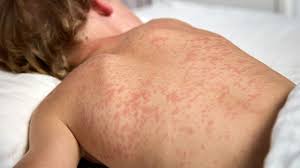
WHO South-East Asia Regional Committee Adopts Key Resolutions on Measles, Rubella Elimination, and Adolescent Health
The Seventy-Seventh Regional Committee Session of the World Health Organization (WHO) South-East Asia concluded with member countries adopting resolutions that set ambitious new targets for measles and rubella elimination, expanded the regional health emergency fund, and pledged to build adolescent-responsive health systems. These resolutions reflect a strong commitment to enhancing public health and addressing emerging health challenges across the region.
New Measles and Rubella Elimination Target Set for 2026
The committee extended the target for eliminating measles and rubella in the South-East Asia region to 2026, revising the earlier target of 2023. This decision was accompanied by the endorsement of the “Strategic Plan for Measles and Rubella Elimination and Sustenance in the WHO South-East Asia Region 2024–2028.” The strategic plan aims to strengthen and sustain the progress made by countries in eliminating these diseases, which have significant public health implications.
Despite disruptions caused by the COVID-19 pandemic, five countries in the region have successfully achieved measles and rubella elimination. Speaking at the session, WHO Regional Director Saima Wazed acknowledged the challenges posed by the pandemic but expressed optimism about the renewed elimination target. “I am pleased that the Regional Committee has resolved to revise the elimination target, reflecting our collective resolve to overcome these challenges,” she stated.
Health Emergency Fund Expanded to Address Regional Crises
In a significant move, member countries agreed to triple the corpus of the South-East Asia Regional Health Emergency Fund (SEARHEF) to USD 3 million, effective from 2026. This expansion aims to bolster the region’s capacity to respond to health emergencies. In addition to supporting lifesaving interventions during emergency situations, the expanded SEARHEF will help fill critical gaps in health emergency preparedness and strengthen the capacities of member countries.
Commitment to Adolescent-Responsive Health Systems
The session also endorsed a Ministerial Declaration on Adolescent-Responsive Health Systems, which had been adopted earlier in the week during a ministerial roundtable. The declaration calls for policies, resources, and services tailored to the unique health needs of adolescents. It emphasizes the development of adolescent-responsive health systems as a crucial strategy for strengthening primary healthcare-oriented health systems and achieving universal health coverage (UHC).
Progress Towards Universal Health Coverage and SDGs
Throughout the three-day session, the Regional Committee reviewed progress made towards achieving universal health coverage and health-related Sustainable Development Goals (SDGs). Member countries shared their initiatives and reiterated their commitment to accelerating efforts to meet global health targets. Discussions covered a range of health priorities, including traditional medicine, strengthening health workforce education and training, and intensifying efforts for dengue control and malaria elimination.
Key resolutions discussed included the decade of action to end viral hepatitis, HIV, and sexually transmitted infections (STIs); universal access to people-centered healthcare services; a progress and acceleration plan for non-communicable diseases (NCDs); and advancing health emergency preparedness and response in the region.
Felicitations for Public Health Achievements
The session concluded with WHO recognizing several countries for their remarkable achievements in public health. Bhutan was awarded for meeting interim targets for cervical cancer elimination, while India was lauded for eliminating trachoma. Timor-Leste was recognized for eliminating lymphatic filariasis, and Maldives and Sri Lanka for achieving Hepatitis B control in children. Bhutan also received an award for achieving the SDG and global targets for reducing under-five mortality and stillbirth rates.
The Democratic People’s Republic of Korea, Indonesia, Maldives, Sri Lanka, and Thailand were also acknowledged for their success in reducing under-five mortality, neonatal mortality, and stillbirth rates, marking significant strides towards global health goals.
Looking Ahead: A Unified Vision for Regional Health
During the session, WHO Director-General Dr. Tedros Adhanom Ghebreyesus emphasized the importance of continued collaboration, urging member states to engage actively in the upcoming negotiations for the Pandemic Agreement. Echoing these sentiments, Regional Director Saima Wazed commended member countries for their commitment to public health and reiterated WHO’s ongoing support.
“We are one team with a unified vision—a vision that can benefit every living person on this planet. I am pleased to be among you in this noble calling, and in this noble endeavor of ours,” Wazed stated at the closing of the session.
The resolutions adopted at the Seventy-Seventh Regional Committee Session set the stage for enhanced regional cooperation, robust health emergency preparedness, and targeted health interventions that prioritize the needs of the region’s most vulnerable populations. With these renewed commitments, the WHO South-East Asia Region is poised to make further progress in achieving its health and development goals.